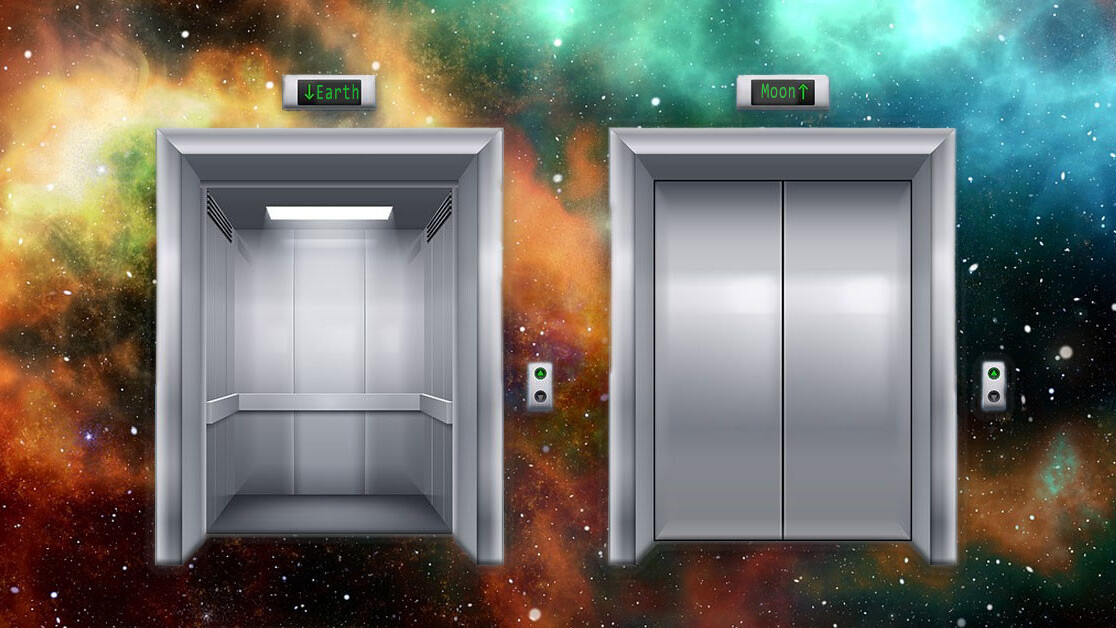
It’s not quite a “Stairway to Heaven,” but scientists have come up with what appears to be a perfectly feasible plan to build an elevator to the Moon. Or, more accurately, a Spaceline from the Moon to the Earth.
In a paper published in late August, astrophysicists Zephyr Penoyre and Emily Sandson of the University of Cambridge and Columbia University respectively, describe a method for the construction of a 322,000 kilometer-long (200,000 miles) cable anchored to the Moon and dangled across space into the Earth’s gravitational field.
Before we get into how, let’s talk about why we’d want to build an elevator to the Moon. The easiest answer is that it’s incredibly cost-effective. According to a report from Observer, lead author on the study Penoyre said the cost of construction could be estimated as being “within the whim of one particularly motivated billionaire.”
(Paging Elon Musk and Jeff Bezos, your wallets are needed.)
Once constructed, the Spaceline would operate using cheap, powerful solar energy. We’d be able to move supplies back and forth to the Moon at a fraction of the cost it would take under the current spaceship-to-spacestation-to-Moon paradigm. That’s not to mention the difficulty in achieving a straight-shot soft landing on the Moon – as is evidenced by the recent crash that left doomed tardigrades stranded on the Lunar surface.
Considering the US government’s plans to set up shop on the Moon in order to begin arranging crewed missions to Mars, it’s likely the shipping lanes between our planet and its satellite will soon become both incredibly crowded and very lucrative. A space elevator would be revolutionary.
The elevator-to-the-Moon idea isn’t fresh, it’s an old science fiction-based theory. Originally it involved tethering a length of cable made from nanofibers (that are, so far, technologically infeasible) to a counterweight in the Earth’s gravity, then stretching it out towards the Moon.
Penoyre and Sandson believe this won’t work with today’s tech. As they write in their study, it’s simply not possible to build a cable that’s strong enough at such astronomical lengths to withstand the Earth’s gravity:
Classic space elevators are supported by centrifugal forces, and thus require a large counterweight beyond geostationary orbit to counteract Earth’s gravitational pull. These competing forces put the cable in a large amount of tension, and even when the cable has a tapered profile (which minimizes the tension), there is a large weight of cable close to the Earth which experiences huge gravitational forces.
For decades this seemingly insurmountable problem stalled research to the point where “one day we’ll have the materials to do this” seemed to be the ultimate sentiment concerning the construction of a space elevator. And then Penoyre and Sandson flipped the script.
They did the math and determined that anchoring the Spaceline to the Moon and letting it dangle into the Earth’s atmosphere would make it feasible using currently available materials. They wrote:
A cable which only hangs into Earth’s gravitational well need not be thick or massive. It is optimal to make it as thin as possible as it extends closer to Earth. This means that the gravitational forces the cable feels, and thus the tension, is much reduced.

The most astonishing thing about this idea is that it seems obvious now that a team’s gone through all the trouble of crunching the numbers. In fact, according to their paper, Penoyre and Sandson seem to think that we’ve been shooting ourselves in the foot for decades by not seeing this solution before:
We present the derivations herein as a full standalone mathematical and physical description of the concept, one that we and authors before us have been surprised to find is eminently plausible and may have been overlooked as a major step in the development of our capacity as a species to move within our solar system.
The Spaceline, as envisioned, has the potential to usher humanity into a new era of prosperity. It’s not just an elevator to the Moon – it could be the extraterrestrial equivalent of the advent of railroad technology.
Get the TNW newsletter
Get the most important tech news in your inbox each week.




